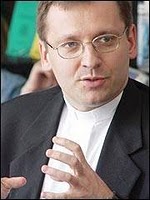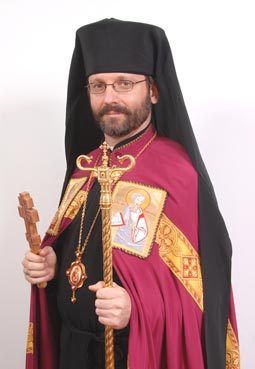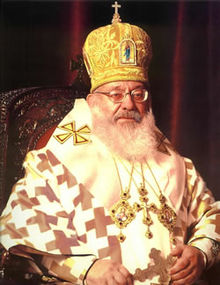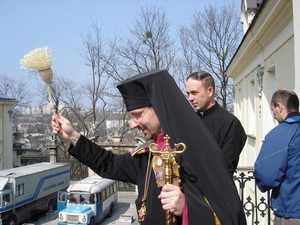 The Ukrainian Greek Catholic Church is facing new challenges in the coming years and the Church’s Synod of Bishops (the Sobor) has decided to meet the challenge head-on: the Synod elected and the Pope confirmed communion with, a 40 year bishop Sviatoslav Shevchuk, a man who’s been bishop for less than 2 years and a moral theologian.
The Ukrainian Greek Catholic Church is facing new challenges in the coming years and the Church’s Synod of Bishops (the Sobor) has decided to meet the challenge head-on: the Synod elected and the Pope confirmed communion with, a 40 year bishop Sviatoslav Shevchuk, a man who’s been bishop for less than 2 years and a moral theologian.
Tag: patriarch
Sviatoslav Shevchuk, 40, new major archbishop (patriarch) of the Ukrainian Greek Catholic Church
Béshara Raï elected new Maronite Patriarch
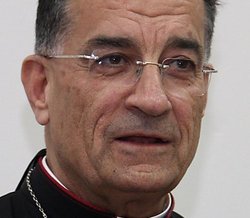 Only 20 years junior to the out-going patriarch, His Beatitude Nasrallah Peter Sfeir, the Maronite bishops elected today Bishop Béshara Raï, 71, as the new patriarch. He’s 77th patriarch of the Maronites; Raï takes up the See of St Peter (Peter’s first diocese before moving to Rome), adopting the name Peter. He will be known as “His Beatitude, Patriarch Béshara Peter Raï.“
Only 20 years junior to the out-going patriarch, His Beatitude Nasrallah Peter Sfeir, the Maronite bishops elected today Bishop Béshara Raï, 71, as the new patriarch. He’s 77th patriarch of the Maronites; Raï takes up the See of St Peter (Peter’s first diocese before moving to Rome), adopting the name Peter. He will be known as “His Beatitude, Patriarch Béshara Peter Raï.“
Patriarch Nasrallah Peter Sfeir, retires as Maronite leader
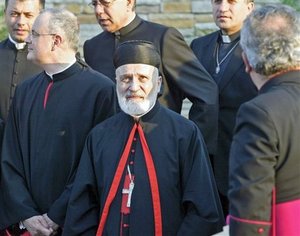 Today, Pope Benedict XVI accepted the petition of His Beatitude, Patriarch Nasrallah Peter Sfeir, cardinal, to retire from his pastoral leadership as the Father of Maronite Church.
Today, Pope Benedict XVI accepted the petition of His Beatitude, Patriarch Nasrallah Peter Sfeir, cardinal, to retire from his pastoral leadership as the Father of Maronite Church.
Transitioning from Husar to new era in the Ukrainian Church …?
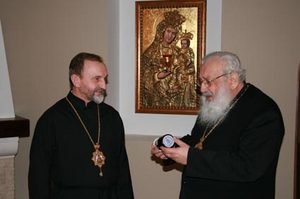 In the past weeks we’ve seen the Pontiff accepting the resignation of His Beatitude Cardinal Lubomyr Husar, 78, as the Major Archbishop of the Ukrainian Catholic Church. Bishop Ihor Voznyak is the temporary administrator of the Church until a new leader is elected.
In the past weeks we’ve seen the Pontiff accepting the resignation of His Beatitude Cardinal Lubomyr Husar, 78, as the Major Archbishop of the Ukrainian Catholic Church. Bishop Ihor Voznyak is the temporary administrator of the Church until a new leader is elected.
Continue reading Transitioning from Husar to new era in the Ukrainian Church …?
Lubomyr Cardinal Husar, MSU, Major Archbishop of the Ukrainian Catholic Church, retires
Maronite Patriarch said ready to resign
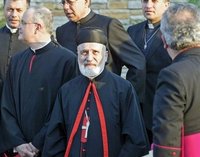 Patriarch Nasrallah Peter Sfeir, 90, the 76th head of the Maronite Church is said to have submitted a resignation a few months ago to His Holiness, Pope Benedict XVI. The Daily Star has stated this move of Sfeir’s, but the paper has several facts wrong, so the reliability of specifics is questionable.
Patriarch Nasrallah Peter Sfeir, 90, the 76th head of the Maronite Church is said to have submitted a resignation a few months ago to His Holiness, Pope Benedict XVI. The Daily Star has stated this move of Sfeir’s, but the paper has several facts wrong, so the reliability of specifics is questionable.
Saint Andrew: the Ecumenical agenda
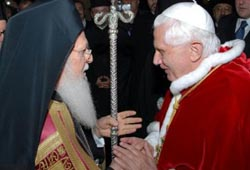 Saint Andrew is the first of the 12 Apostles called by Jesus to follow Him. Today is his feast day, the day traditionally remembered as the day of his death.
Saint Andrew is the first of the 12 Apostles called by Jesus to follow Him. Today is his feast day, the day traditionally remembered as the day of his death.
Bartholomew takes on critics of dialog, establishes Orthodox concern for Church unity
I’ve provided here excerpts of Bartholomew I’s Patriarchal and Synodal Encyclical, published on the Sunday of Orthodoxy (
Catholics have their own irrational critics of the ecumenical movement, but I think there is sometimes good reason for the ecumenical leaders to pay attention to thoughtful criticism. I think we have been saddled with misguided “ecumenists” who capitulate to others some substantial matters like the nature of truth, morals, the sacred Liturgy, dogma, ecclesiology, teaching authority, etc.
But with this patriarchal letter, Bartholomew sets the stage for thinking intelligently and faithfully in an effort to work toward unity among Christians, without which the Christian witness to Christ as Lord and Savior and the sacramentality of the Church is weakened. There are matters raised by the critics that need to be dealt with directly, like: To what end do the dialogues aim? Is full, visible unity possible, or are we wasting our time? Can a selective reading of history be set aside and real scholarship emerge to shed light on historical events and gestures and theological reflection? How do we discern the work of the Holy Spirit in the dialogues? Are truth claims made by the Churches (
Funny, this letter will be read by the Catholic world on the ancient feast of the Chair of Peter on who whose witness we rely on for Christian unity. Would that the irony might be an opportunity for more concrete expressions unity of life in Christ. What Bartholomew says of the Orthodox Church is applicable to the Roman Church. Emphasis is mine.
May Saint Peter and Saint Andrew with Mary, Mother of God, pray for us.
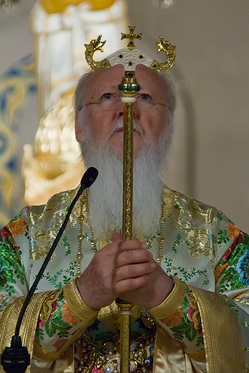 With a sense of duty and responsibility, despite its hurdles and problems, as the First-Throne Church of Orthodoxy, the Ecumenical Patriarchate cares about protecting and establishing the unity of the Orthodox Church, in order that with one voice and in one heart we may confess the Orthodox faith of our Fathers in every age and even in our times. For, Orthodoxy is not a museum treasure that must be preserved; it is a breath of life that must be transmitted and invigorate all people. Orthodoxy is always contemporary, so long as we promote it with humility and interpret it in light of the existential quests and needs of humanity in each historical period and cultural circumstance.
With a sense of duty and responsibility, despite its hurdles and problems, as the First-Throne Church of Orthodoxy, the Ecumenical Patriarchate cares about protecting and establishing the unity of the Orthodox Church, in order that with one voice and in one heart we may confess the Orthodox faith of our Fathers in every age and even in our times. For, Orthodoxy is not a museum treasure that must be preserved; it is a breath of life that must be transmitted and invigorate all people. Orthodoxy is always contemporary, so long as we promote it with humility and interpret it in light of the existential quests and needs of humanity in each historical period and cultural circumstance.
To this purpose, Orthodoxy must be in constant dialogue with the world. The Orthodox Church does not fear dialogue because truth is not afraid of dialogue. On the contrary, if Orthodoxy is enclosed within itself and not in dialogue with those outside, it will both fail in its mission and no longer be the “catholic” and “ecumenical” Church. Instead, it will become an introverted and self-contained group, a “ghetto” on the margins of history. This is why the great Fathers of the Church never feared dialogue with the spiritual culture of their age – indeed even with the pagan idolaters and philosophers of their world – thereby influencing and transforming the civilization of their time and offering us a truly ecumenical Church.
Today, Orthodoxy is called to continue this dialogue with the outside world in order to provide a witness and the life-giving breath of its faith. However, this dialogue cannot reach the outside world unless it first passes through all those that bear the Christian name. Thus, we must first converse as Christians among ourselves in order to resolve our differences, in order that our witness to the outside world may be credible. Our endeavors for the union of all Christians is the will and command of our Lord, who before His Passion prayed to His Father “that all [namely, His disciples] may be one, so that the world may believe that You sent me.” (John 17.21) It is not possible for the Lord to agonize over the unity of His disciples and for us to remain indifferent about the unity of all Christians. This would constitute criminal betrayal and transgression of His divine commandment.
It is precisely for these reasons that, with the mutual agreement and participation of all local Orthodox Churches, the Ecumenical Patriarchate has for many decades conducted official Panorthodox theological dialogues with the larger
These dialogues, together with every effort for peaceful and fraternal relations of the Orthodox Church with other Christians, are unfortunately challenged today in an unacceptably fanatical way – at least by the standards of a genuinely Orthodox ethos – by certain circles that exclusively claim for themselves the title of zealot and defender of Orthodoxy. As if all the Patriarchs and Sacred Synods of the Orthodox Churches throughout the world, who unanimously decided on and continue to support these dialogues, were not Orthodox. Yet, these opponents of every effort for the restoration of unity among Christians raise themselves above Episcopal Synods of the Church to the dangerous point of creating schisms within the Church.
In their polemical argumentation, these critics of the restoration of unity among Christians do not even hesitate to distort reality in order to deceive and arouse the faithful. Thus, they are silent about the fact that theological dialogues are conducted by unanimous decision of all Orthodox Churches, instead attacking the Ecumenical Patriarchate alone. They disseminate false rumors that union between the Roman Catholic and
Beloved children in the Lord, Orthodoxy has no need of either fanaticism or bigotry to protect itself. Whoever believes that Orthodoxy has the truth does not fear dialogue, because truth has never been endangered by dialogue. By contrast, when in our day all people strive to resolve their differences through dialogue, Orthodoxy cannot proceed with intolerance and extremism. You should have utmost confidence in your
It all started here: What Christianity in Constantinople gave to the world
Those interested the roots of Christianity ought to watch the 60 Minutes story on Patriarch Bartholomew. Don’t neglect watching the 3 extra video pieces located to the right on the 60 Minutes’ page.
